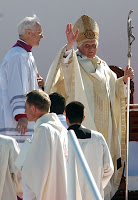If there is any characteristic that seems to join
otherwise disparate Arab leaders facing their spring, it is desperation. No one exhibits that more than Bashar
al-Assad. The West trained
ophthalmologist was reluctant to take on leadership of the family business. At the start he came off as a reasonable
reformist. In almost Jekyll-Hyde fashion
the Assad we see today has morphed from mild mannered doctor into ruthless monster. When your world is threatened you do
desperate things.
Albeit in a profoundly different way, the same
desperate reaction seems to be taking hold in Rome these days as the pope and
his princes take on what they undoubtedly see as revolutionary threats to their
own realm. Benedict began as his
predecessor’s enforcer and perhaps only during his own reign have we been given
a more accurate window into how truly conservative the charismatic John Paul II
really was. Remember that Benedict was
elevated just one day
after the start of April 2005 conclave. It would seem that succession had been set
before John Paul’s death. Benedict is
likely to follow suit. He has now
appointed more voting
and like-minded cardinals than his successor, and his reign has not ended.
The Roman church has never claimed to be a
democracy. From the early days it has
had top down leadership from an infallible
and authoritarian pope. So its tolerance
for dissent or any deviation from established doctrine has been very limited,
often non-existent. That has especially
been the case when the Church sees itself under threat, something that has
happened at times throughout its history.
That is likely why Rome, in an assertion of absolute
power, has come down so hard on the American Leadership Conference of Women
Religious, placing its member nuns under the control of three male bishops. It seems clear that it is willing to jettison
a critical component of Church personnel — 80% of American nuns — to make the
point. In their just completed national
assembly held in St. Louis, the LCWR agreed to seek
open dialogue with Rome. But there
was no sign that the nuns were willing to back down. So where these talks will go remains an open
question, an ongoing problem for the Church.
Now, adding to that comes the report of Rome’s apparent
intention to strip the Pontifical Catholic University of Peru of its name, and more importantly its right to call
itself Catholic. Beyond the question of
Papal authority, the conflict in Lima reflects the same kind of right/left
struggle that has taken over our politics here and around the world. It is a battle for supremacy between
conservatives who are increasingly ultra-conservative and progressives:
moderate or liberal.
The Peruvian struggle is of particular interest since
it involves two twentieth century created movements within the church, both of
Hispanic origin. On the conservative
side is Opus Dei founded by
the Spanish cleric Josemaría Escrivá de
Balaguer in 1928. This once fringe right
movement has found a receptive audience in the current Vatican. Among those Americans who attend mass at Opus
Dei oriented churches are Justice Antonin Scalia and former Senator Rick
Santorum. On the other side is Liberation Theology
a populist approach with 1950s-60s roots in Latin America. One of its leading exponents is Gustavo Gutiérrez, the Peruvian priest who coined the word, and
a leading faculty member of the university.
Are these alone — a group of independent thinking nuns and a similarly inclined
university — enough to make Rome desperate?
Probably not, and the pope would surly challenge any such notion of
desperation on his part, and vehemently so.
But add to these two the just released poll by the research
consortium WIN-Gallup International about
the dramatic decline
of religiosity in the world. It
focuses on changes that has taken place in just the last seven years, most notably in Catholic
Ireland. Today, only 47% of the Irish
consider themselves religious, that’s a drop of 22 points from the 60% reported
in 2005. If some nuns and academics
don’t drive Rome to distraction, then these numbers certainly must. Perhaps the Church isn’t entirely losing its
grip on the faithful, but it is clearly losing ground at what should be seen as an
alarming rate.
The WIN-Gallup poll should be a wake-up-call for all
religious groups. Religiosity worldwide
has fallen 9 points in the last seven years.
People who call themselves religious today represent 59% of the
population, down from 68%. An even
larger drop has been experienced in the United States (13 points) from 73% in
’05 to 60% today. We may still call
ourselves the most religious country, but it’s fast becoming a hollow
claim.
Stay tuned for some news on an expanded exploration of people living beyond
religion in book form coming in the near future.
Image from Wikipedia

No comments:
Post a Comment